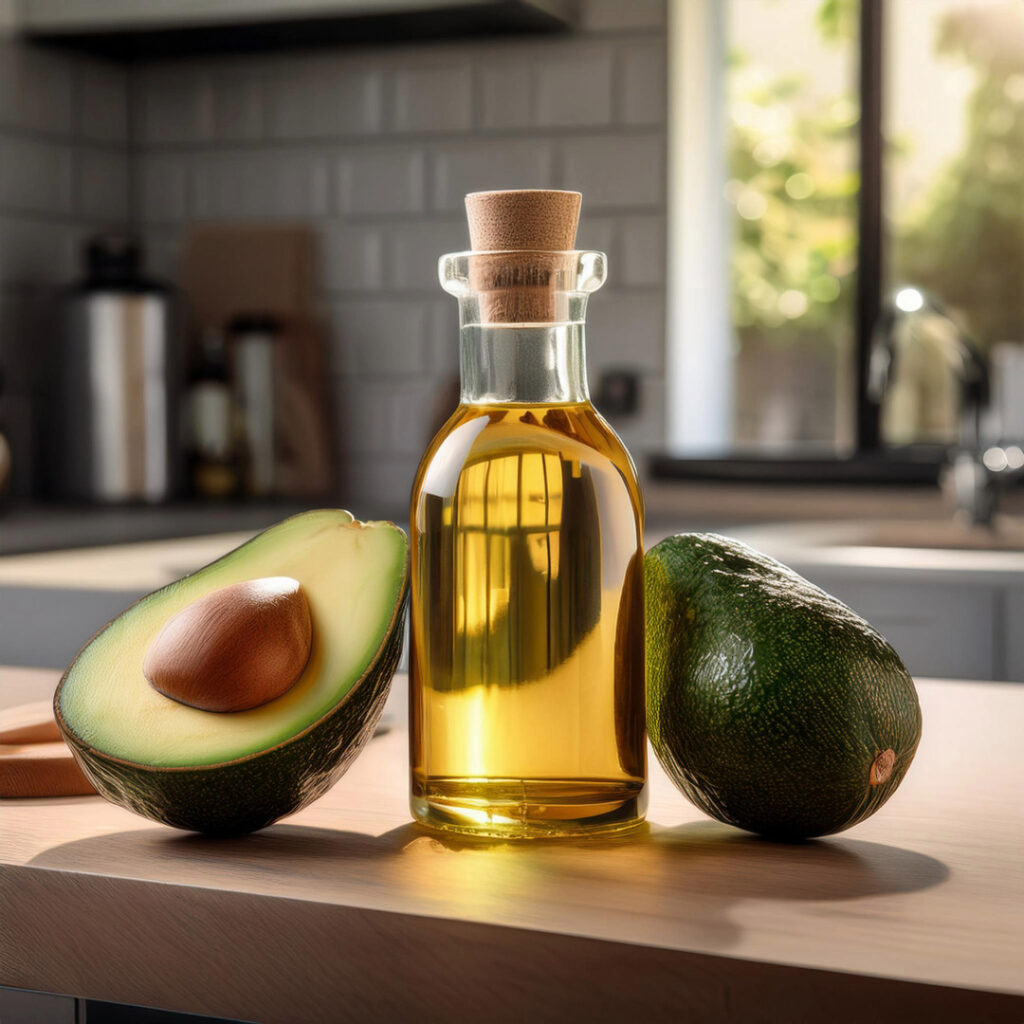Avocado oil is more than just a trendy ingredient—it’s a versatile, nutrient-rich oil that has found its way into kitchens and skincare routines worldwide. With its high content of healthy fats, vitamins, and antioxidants, avocado oil is celebrated for its numerous health benefits. Whether you’re drizzling it over a salad or applying it to your skin, avocado oil can be a valuable addition to your daily routine. In this post, we’ll explore the benefits of avocado oil for cooking and skincare, diving deep into its composition, uses, and the science behind its effectiveness.
1. What is Avocado Oil?
1.1. Extraction and Production
Avocado oil is extracted from the pulp of the avocado fruit (Persea americana), unlike most oils that are derived from seeds. The extraction process typically involves cold-pressing, which helps retain the oil’s nutrients. Cold-pressed avocado oil has a rich, green color and a slightly nutty flavor, making it a popular choice for both culinary and cosmetic uses.
1.2. Nutritional Profile
Avocado oil is rich in monounsaturated fats, particularly oleic acid, which constitutes about 70% of the oil. It also contains:
- Vitamin E: A potent antioxidant that protects cells from oxidative damage.
- Potassium: Essential for maintaining normal blood pressure levels.
- Lecithin: A fatty substance that acts as a moisturizer and emollient for the skin.
- Phytosterols: Plant compounds that help reduce cholesterol levels.
2. Avocado Oil in Cooking
2.1. High Smoke Point: Ideal for Cooking
One of the standout features of avocado oil is its high smoke point, which ranges from 375°F (190°C) to 520°F (271°C) depending on the type (refined or unrefined). This makes avocado oil suitable for a variety of cooking methods, including:
- Sautéing: The high smoke point ensures that the oil won’t break down and produce harmful compounds when exposed to high heat.
- Frying: Avocado oil is an excellent choice for frying foods, providing a healthier alternative to traditional frying oils.
- Grilling and Roasting: Its stability at high temperatures makes it perfect for grilling and roasting meats and vegetables.
2.2. Health Benefits of Cooking with Avocado Oil
Cooking with avocado oil can offer numerous health benefits, thanks to its rich nutritional profile.
- Heart Health: The high levels of monounsaturated fats in avocado oil help lower bad cholesterol (LDL) while increasing good cholesterol (HDL), reducing the risk of heart disease.
- Nutrient Absorption: Avocado oil can enhance the absorption of fat-soluble vitamins (A, D, E, and K) from other foods, making your meals more nutritious.
- Anti-Inflammatory Properties: Oleic acid, the predominant fatty acid in avocado oil, has been shown to reduce inflammation, which is linked to a variety of chronic diseases.
2.3. Culinary Uses of Avocado Oil
Avocado oil’s mild flavor and versatility make it a great addition to many dishes.
- Salad Dressings and Marinades: Use avocado oil as a base for salad dressings or marinades, where its subtle taste complements a variety of ingredients.
- Baking: Substitute avocado oil for butter or other oils in baking recipes for a healthier alternative.
- Dips and Sauces: Avocado oil can be used in homemade mayonnaise, aioli, or pesto, adding a creamy texture and rich flavor.
3. Avocado Oil in Skincare
3.1. Benefits of Avocado Oil for the Skin
Avocado oil is a popular ingredient in skincare due to its moisturizing, anti-inflammatory, and antioxidant properties.
- Moisturization: Avocado oil is an excellent moisturizer, as it penetrates the skin deeply and is absorbed quickly. The oleic acid in the oil helps to replenish and lock in moisture, making it ideal for dry or dehydrated skin.
- Anti-Aging: The antioxidants in avocado oil, such as vitamin E and carotenoids, help combat free radicals, which contribute to the signs of aging. Regular use of avocado oil can help reduce the appearance of fine lines and wrinkles.
- Wound Healing: Avocado oil’s anti-inflammatory properties make it effective in promoting wound healing. Studies have shown that it can accelerate the healing process of wounds and cuts by promoting collagen synthesis.
3.2. How to Use Avocado Oil in Your Skincare Routine
Incorporating avocado oil into your skincare routine is easy and can be done in various ways:
- As a Facial Moisturizer: Apply a few drops of avocado oil to your face after cleansing and toning. Massage it gently into your skin, focusing on dry areas.
- In DIY Masks: Combine avocado oil with other natural ingredients like honey, yogurt, or oatmeal to create nourishing face masks that hydrate and soothe the skin.
- For Hair Care: Avocado oil can be used as a hair treatment to moisturize and strengthen hair. Apply it to your scalp and hair, leave it on for 20-30 minutes, then wash it out with shampoo.
- As a Makeup Remover: Use avocado oil to gently remove makeup, including stubborn eye makeup, without stripping the skin of its natural oils.
3.3. Avocado Oil for Specific Skin Conditions
Avocado oil can be particularly beneficial for individuals with specific skin concerns:
- Eczema and Psoriasis: The anti-inflammatory and moisturizing properties of avocado oil can help alleviate the symptoms of eczema and psoriasis, reducing redness, itching, and flakiness.
- Acne-Prone Skin: While it may seem counterintuitive to use oil on acne-prone skin, avocado oil’s non-comedogenic nature means it won’t clog pores. It also helps balance the skin’s natural oils, potentially reducing the occurrence of breakouts.
- Sunburn Relief: Avocado oil’s soothing properties can provide relief from sunburn. Apply it to the affected area to reduce inflammation and promote healing.
4. Choosing the Right Avocado Oil
4.1. Refined vs. Unrefined Avocado Oil
When shopping for avocado oil, you’ll encounter both refined and unrefined varieties, each with its own set of benefits:
- Unrefined Avocado Oil: This type is cold-pressed and retains most of the fruit’s natural flavors, colors, and nutrients. It’s ideal for salad dressings, drizzling over dishes, or as a finishing oil.
- Refined Avocado Oil: Refined avocado oil has been filtered to remove impurities, resulting in a lighter color and neutral flavor. It has a higher smoke point, making it better suited for high-heat cooking.
4.2. Organic and Extra Virgin Options
Opt for organic and extra virgin avocado oils whenever possible. Organic avocado oil is free from pesticides and synthetic chemicals, while extra virgin avocado oil is the highest quality, offering the purest flavor and the most health benefits.
4.3. Storage Tips
To maintain the quality of your avocado oil, store it in a cool, dark place, away from heat and light. This will help prevent oxidation and extend its shelf life. Keep the bottle tightly sealed when not in use.
5. Potential Side Effects and Considerations
5.1. Allergic Reactions
Although rare, some individuals may be allergic to avocado oil, especially if they have a latex allergy. Symptoms can include itching, swelling, or redness after using the oil on the skin. If you suspect an allergy, it’s best to perform a patch test before using avocado oil more extensively.
5.2. Dietary Considerations
Avocado oil is calorie-dense, so it’s important to use it in moderation, especially if you’re watching your caloric intake. While the fats in avocado oil are healthy, consuming large amounts can still contribute to weight gain.
5.3. Interactions with Medications
If you’re on blood pressure or blood-thinning medications, consult your healthcare provider before adding large amounts of avocado oil to your diet, as its high potassium content may interact with these medications.
6. Conclusion: The Versatility of Avocado Oil
Avocado oil is a powerful, multipurpose oil that offers a wide range of benefits for both cooking and skincare. Its high smoke point and nutritional profile make it an excellent choice for healthy cooking, while its moisturizing and anti-inflammatory properties make it a valuable addition to any skincare routine. Whether you’re looking to enhance your meals or improve your skin, avocado oil is a versatile, natural solution that can cater to your needs.

References
- USDA National Nutrient Database. “Avocado Oil, Nutrient Profile.”
- Dreher, M. L., & Davenport, A. J. (2013). “Hass avocado composition and potential health effects.” Critical Reviews in Food Science and Nutrition.
- Al-Dabbas, M. M., & Oti, E. A. (2011). “Avocado oil: Characteristics and potential health benefits.” Journal of Agricultural Science.
- Trujillo-Mayol, I., et al. (2018). “Avocado oil: Effects on health and risk of metabolic disorders.” Journal of Nutritional Biochemistry.


